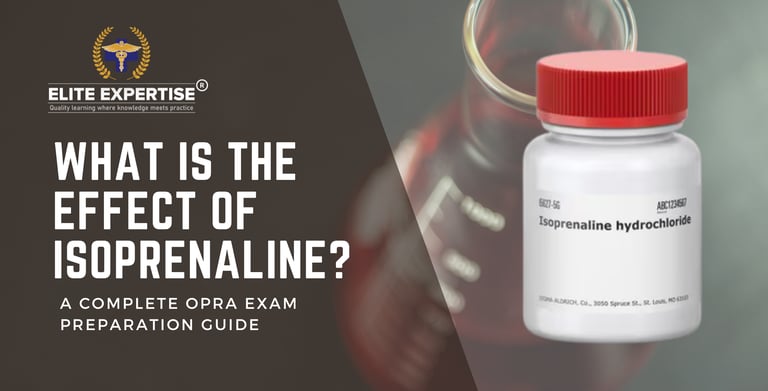ASK MY PHARMACIST | GOT QUESTIONS? Your pharmacist has answers. Click Here
What is the effect of isoprenaline? A complete OPRA Exam preparation guide
Learn the pharmacology of Isoprenaline – a non-selective β1 & β2 agonist. Discover its effects, clinical uses, side effects, and exam tips for OPRA preparation. Compare with adrenaline & noradrenaline for better exam success.
Krupa
9/17/20252 min read


Key Takeaways:
Isoprenaline is a non selective beta-adrenergic agonist that stimulates both β1 and β2 adrenergic receptors.
Due to its mechanism of action, it increases heart rate, cardiac output, and causes bronchodilation.
Isoprenaline is used mainly in abnormal slow heart rate (bradycardia), heart block, and bronchospasm.
Common side effects of isoprenaline include tachycardia, arrhythmias, and palpitations.
These types of important medications are high yield topics in competitive exams like OPRA which will test the knowledge of candidates in cardiovascular pharmacology.
What is Isoprenaline?
It is a catecholamine which is synthetically made and it is an active non-selective beta agonist. they don't have any actions on alpha receptors. This is the major difference that isoprenaline has which makes it different from epinephrine and norepinephrine.
Isoprenaline is a Sympathomimetic drug
It shows actions on β1 and β2 receptors
It is a beta agonist
Main effects of isoprenaline is it shows Positive inotropic and chronotropic effect on the heart and also causes bronchodilation
What are the pharmacological effects of Isoprenaline?
What are the clinical or therapeutic uses of Isoprenaline?
Due to the non selective beta receptors nature of isoprenaline, it is not as commonly used. More beta selective agents are available in the market for better results. Some of the clinical importance:
It gives a temporary relief until pacemaker insertion for patients suffering from Bradycardia and heart block
It is rarely used for bronchospasm. They are replaced by selective β2 agonists such as salbutamol.
in specific cases, isoprenaline is used to improve cardiac output during Shock states
What are the adverse reactions of isoprenaline?
Causes Palpitations
Results in Tachycardia
Rarely causes Arrhythmias
Causes Angina in patients with ischemic heart disease
Can cause Tremors, headache, flushing
Isoprenaline in OPRA preparation
questions on sympathomimetics are often asked in competitive exams like OPRA. The OPRA Exam is a test conducted by the Australian pharmacy council to evaluate the international students who wish to work as a pharmacist in Australia.
Pharmacists are considered as frontline healthcare professionals in that country. This makes it very important for pharmacists to have significant knowledge in pharmacology. So such topics like receptor antagonism will become crucial to make appropriate clinical decisions after evaluating the case condition for a pharmacist.
This particular topic is important for exam because, it deals with:
beta-selective and non-selective agonists Differences
Important of making appropriate choices by a pharmacists in Clinical scenarios like bradycardia vs. asthma treatment choices
Adverse effects and contraindications
Point to note for exam: Remember that isoprenaline is non-selective. It stimulates both the heart (β1) and lungs (β2).
Conclusion
Isoprenaline is a powerful non-selective beta agonist with effects on heart and bronchial muscles.However, its clinical use is limited today because of the non selective nature. But it still remains as a core topic in competitive exams like OPRA exam due to its clinical significance.
Points to remember for exam:
Β1 receptor is seen on heart and β2 receptor are seen on lungs and smooth vessels) actions.
Points that will compare isoprenaline with adrenaline and noradrenaline should be remembered for the exam.
Students who prepare for competitive exams should focus on its effects, uses, and side effects
Understanding the core topics such as isoprenaline, will strengthen the basics of pharmacology knowledge and improve the performance in the OPRA exam.


About the Author
Krupa Karamchand
Content Writer | Elite Expertise
Krupa Karamchand is a B. Pharm graduate and KAPS-qualified pharmacist with over 7 years of experience in the pharmaceutical field. As an experienced SEO content writer, she combines her in-depth healthcare knowledge with proven digital strategies to create informative, engaging, and search engine–optimized blogs. Krupa is passionate about making complex medical topics easy to understand and accessible to all readers.
Follow On
Follow Us
+91 76750 84909
Privacy Policy | © 2025 Elite Expertise . All Rights Reserved.
ELITE EXPERTISE PTY. LTD (ABN: 15668292439) (ACN: 668292439)
Australian Statutory Education License: OPP 2025 ELITE EXPERTISE PTY. LTD
Disclaimer
Elite Expertise is an online education platform dedicated solely to providing coaching and preparation services for the OPRA, PEBC, PSI and PTE exams. We do not offer any sponsorship or migration services. All information provided on our platform is for educational purposes only and should not be interpreted as legal or immigration advice. For inquiries regarding sponsorship, visa applications, or migration services, please consult with licensed immigration professionals or relevant authorities.
Elite Expertise is a trusted and results-driven training platform specializing in preparation for international pharmacist licensing exams. Our comprehensive courses, expert instructors, and proven methodologies have helped countless pharmacy professionals achieve their goals and succeed in competitive regulatory exams. We are proud of our strong success rate and commitment to excellence.
Elite Expertise is an independent training provider. We are not affiliated with any global pharmacy regulatory authorities or official exam-conducting bodies.
Copyright © 2026 Elite Expertise. All rights reserved.
Address
Unit 1/73 Beverley St, Doncaster East VIC 3109, Australia
